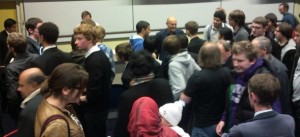Probably the most scientifically demanding Apollo mission, Apollo 15 was launched on 26th July 1971 on a two week mission. Al Worden in the command module orbited the Moon for 75 orbits whilst Dave Scott and James Irwin explored the south eastern edge of Mare Imbrium on the Moon’s surface. Apollo 15 launched with the heaviest payload of all Apollo missions and included the first moon rover, a sub-satellite launched from Apollo 15 in to lunar orbit and a collection of science instruments including a high resolution camera to map the lunar surface.
To coincide with the 40th anniversary, on July 26th 2011, writing with Francis French Al Worden is publishing his autobiography. In this interview recorded in London on 22nd May, Al talks about his test pilot career before joining NASA, the Apollo 15 mission, the “Covers incident” (these were stamped postal covers franked on the day of launch and again the day of ret urn for subsequent public sale) his post NASA career and his autobiography Falling to Earth.
In addition to bringing back 77kg of Lunar Material, high resolution images of the Moon from lunar orbit and images of the zodiacal light, solar corona and gegenschein, Al Worden conducted a 38 minute space walk a day after they fired the engine for their journey home from Lunar orbit.
________________________
Today’s quote is from Al during this interview. It is a reminder that space exploration is not only about cutting-edge technology and breathtaking adventure but it is above all a human endeavour.
“The story of Apollo 15 is a story of betrayal by people and by the government”
Podcast: Play in new window | Download (24.4MB) | Embed
Subscribe: Apple Podcasts | Spotify | RSS | More
